Purchasing expired domain names in the USA can lead to various tax implications, particularly concerning capital gains tax and deductible expenses. It is crucial for investors to understand how domain valuation affects tax reporting and compliance, as this can influence potential gains or losses upon resale. Additionally, buyers must be aware of specific reporting requirements based on the intended use of the domains, which typically involve IRS Form 1040 or Schedule C.
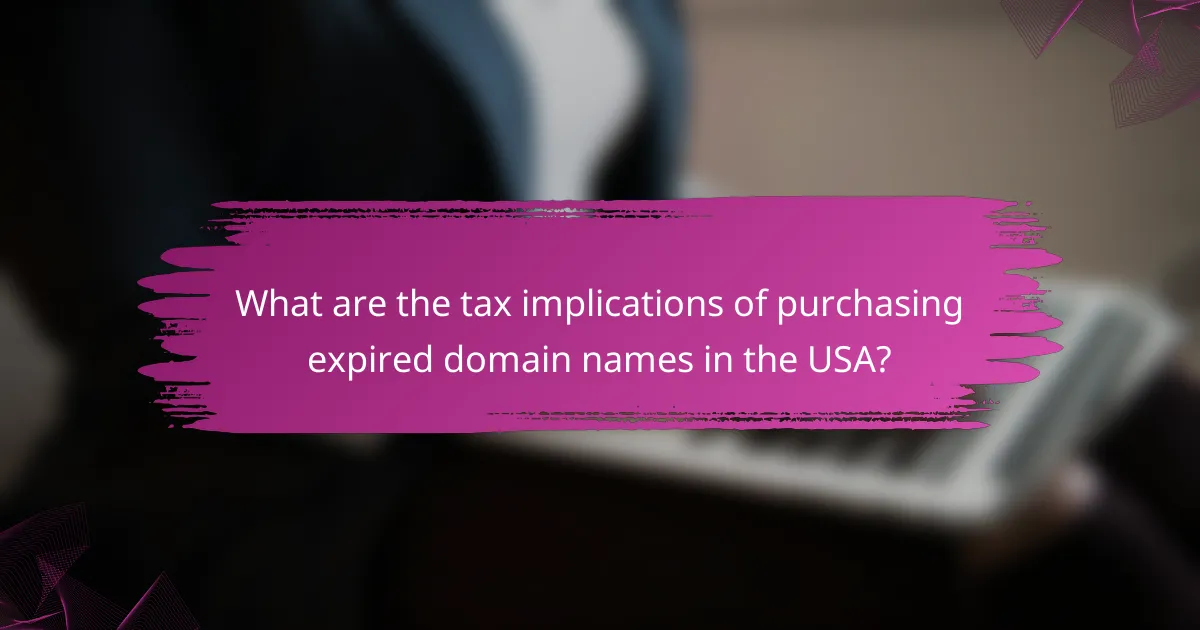
What are the tax implications of purchasing expired domain names in the USA?
Purchasing expired domain names in the USA can have various tax implications, primarily related to capital gains tax, deductible expenses, and sales tax. Understanding these factors is essential for anyone looking to invest in domain names for resale or business purposes.
Capital gains tax considerations
When you sell an expired domain name for a profit, you may be subject to capital gains tax. This tax applies to the difference between your purchase price and the selling price. If you hold the domain for more than a year, you may qualify for long-term capital gains rates, which are typically lower than short-term rates.
For example, if you buy a domain for $100 and sell it for $500 after holding it for over a year, you would pay capital gains tax on the $400 profit. It’s advisable to keep detailed records of your purchases and sales to accurately report these transactions on your tax return.
Deductible expenses related to acquisition
Expenses incurred during the acquisition of expired domain names can often be deducted from your taxable income. This includes the purchase price, registration fees, and any costs associated with transferring ownership. Keeping track of these expenses can help reduce your overall tax liability.
For instance, if you spent $100 on a domain and $20 on registration fees, you could potentially deduct the total of $120 from your taxable income. Be sure to consult with a tax professional to ensure you are claiming all eligible deductions.
Sales tax applicability
In most cases, the purchase of expired domain names is not subject to sales tax in the USA. However, this can vary by state, so it’s important to check local regulations. Some states may impose sales tax on digital goods or services, which could include domain names.
If you are reselling domain names, consider whether your state requires you to collect sales tax from buyers. Understanding your obligations can help you avoid potential penalties and ensure compliance with state tax laws.
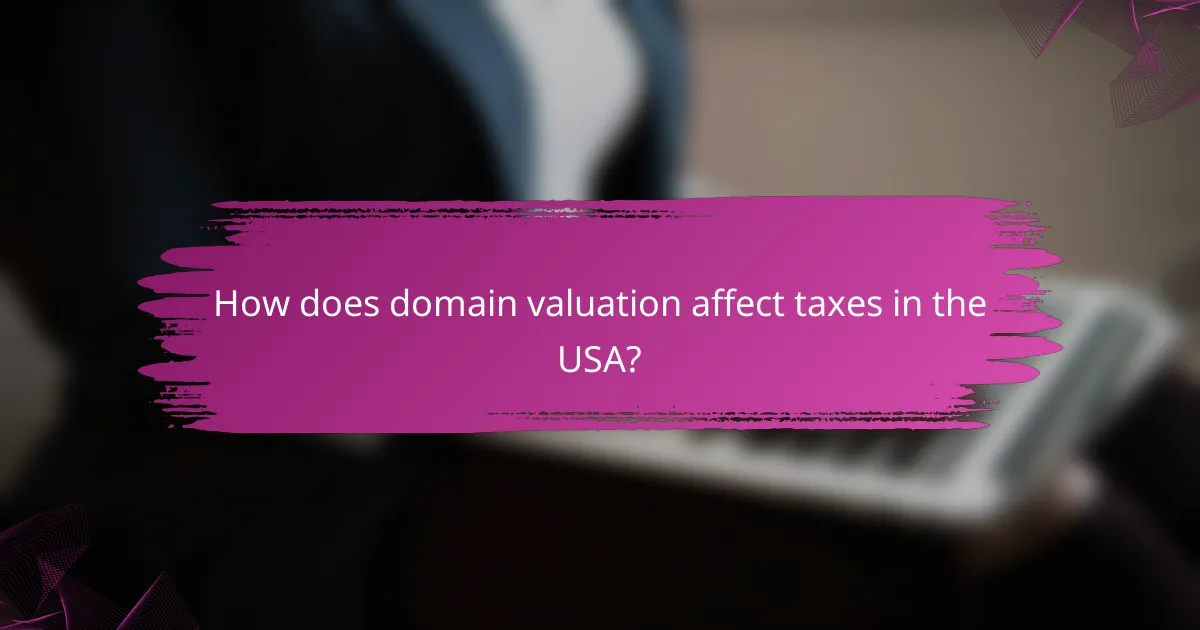
How does domain valuation affect taxes in the USA?
Domain valuation significantly impacts taxes in the USA, as the purchase price of a domain can determine capital gains or losses when sold. Understanding how domains are valued is essential for accurate tax reporting and compliance.
Market value assessment methods
To assess the market value of a domain, several methods can be employed. Common approaches include comparing recent sales of similar domains, using automated appraisal tools, and considering factors like keyword relevance and brandability.
For example, a domain with a popular keyword may fetch a higher price than a generic one. It’s advisable to document the valuation method used, as this can be important for tax reporting and potential audits.
Impact of domain age on valuation
The age of a domain can significantly influence its valuation. Older domains are often perceived as more trustworthy and may have established backlinks, which can enhance their market value.
For instance, a domain that has been registered for several years might be valued higher than a newly registered one, even if both have similar keywords. Buyers should consider the age factor when evaluating potential purchases for investment purposes.
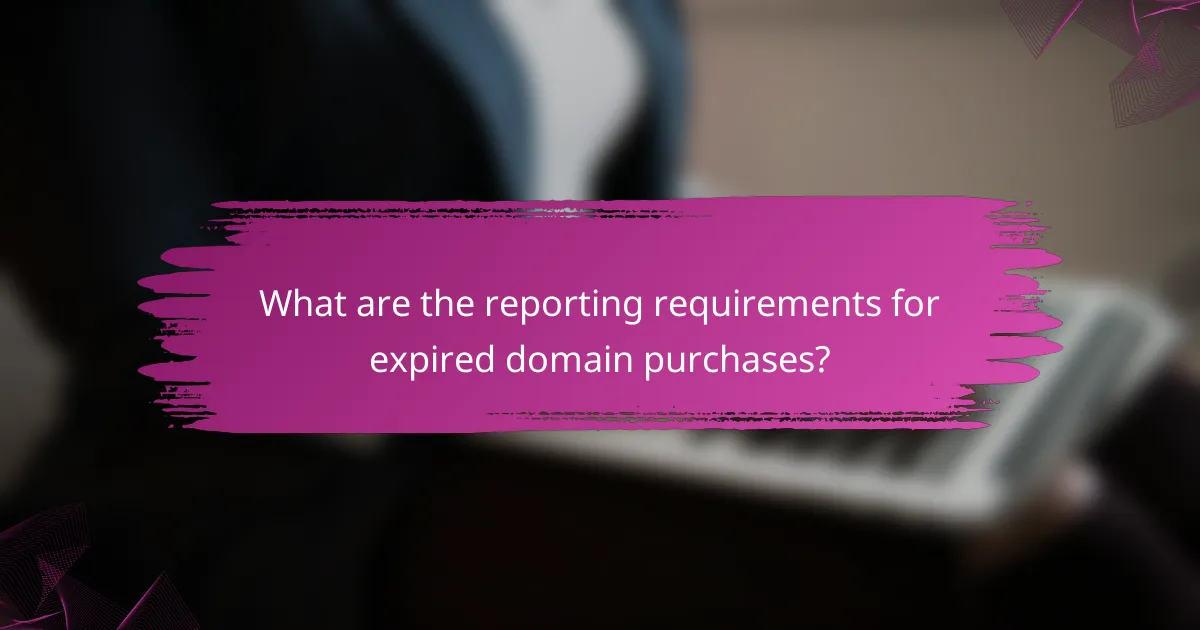
What are the reporting requirements for expired domain purchases?
When purchasing expired domain names in the USA, buyers must adhere to specific reporting requirements based on the intended use of the domains. Generally, these requirements involve reporting the purchase on IRS Form 1040 or Schedule C, depending on whether the domains are for personal or business purposes.
IRS Form 1040 guidelines
If the expired domain is purchased for personal use, it should be reported on IRS Form 1040. This form is used for individual income tax returns and requires you to report any capital gains or losses if you sell the domain later. Keep records of the purchase price and any associated costs, as these will be necessary for accurate reporting.
For personal purchases, it’s essential to understand that the IRS treats domain names as capital assets. If you hold the domain for over a year before selling, you may qualify for long-term capital gains rates, which are generally lower than short-term rates.
Schedule C reporting for business use
If the expired domain is intended for business purposes, you will need to report it on Schedule C, which is part of Form 1040. This schedule allows you to report income and expenses related to your business activities, including the costs of purchasing domain names. Be sure to document all expenses associated with the domain, such as registration fees and hosting costs, as these can be deducted from your business income.
When using a domain for business, it’s crucial to maintain clear records of how the domain contributes to your business operations. This documentation can help substantiate your claims during tax audits and ensure compliance with IRS regulations.
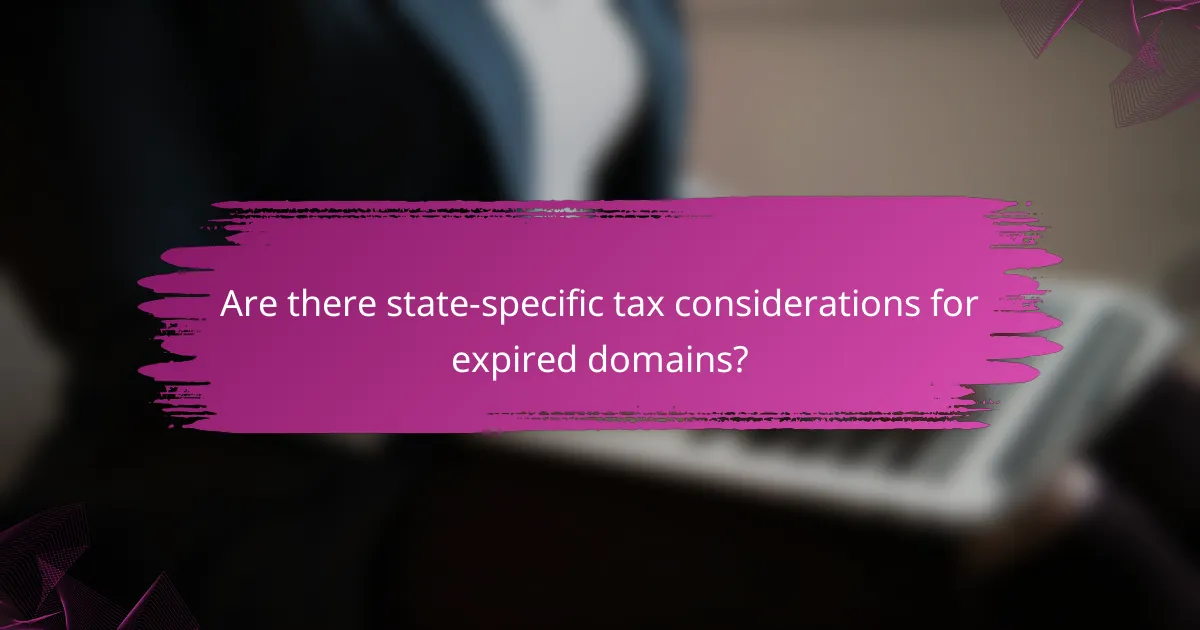
Are there state-specific tax considerations for expired domains?
Yes, purchasing expired domain names can have different tax implications depending on the state in which you operate. It’s essential to understand how state tax regulations may affect your investment and potential revenue from these domains.
California tax regulations
In California, the purchase of expired domain names is generally treated as a tangible asset. As such, it may be subject to sales tax, which can range from around 7.25% to over 10% depending on the local jurisdiction. If you plan to resell the domain, you should also consider the implications of capital gains tax on any profits made.
Additionally, if you are operating as a business in California, you may need to report the domain purchase on your state tax returns. Keeping detailed records of your transactions will help ensure compliance with state regulations.
New York tax implications
In New York, buying expired domain names is similarly treated as a tangible asset, and sales tax may apply. The state sales tax rate is typically around 4%, but local taxes can increase this rate to approximately 8.875% in New York City. Be aware that if you sell the domain for a profit, capital gains tax will also apply.
For businesses, it’s crucial to maintain accurate records of domain purchases and sales, as these will be necessary for tax reporting. Consulting with a tax professional familiar with New York’s regulations can help you navigate these requirements effectively.
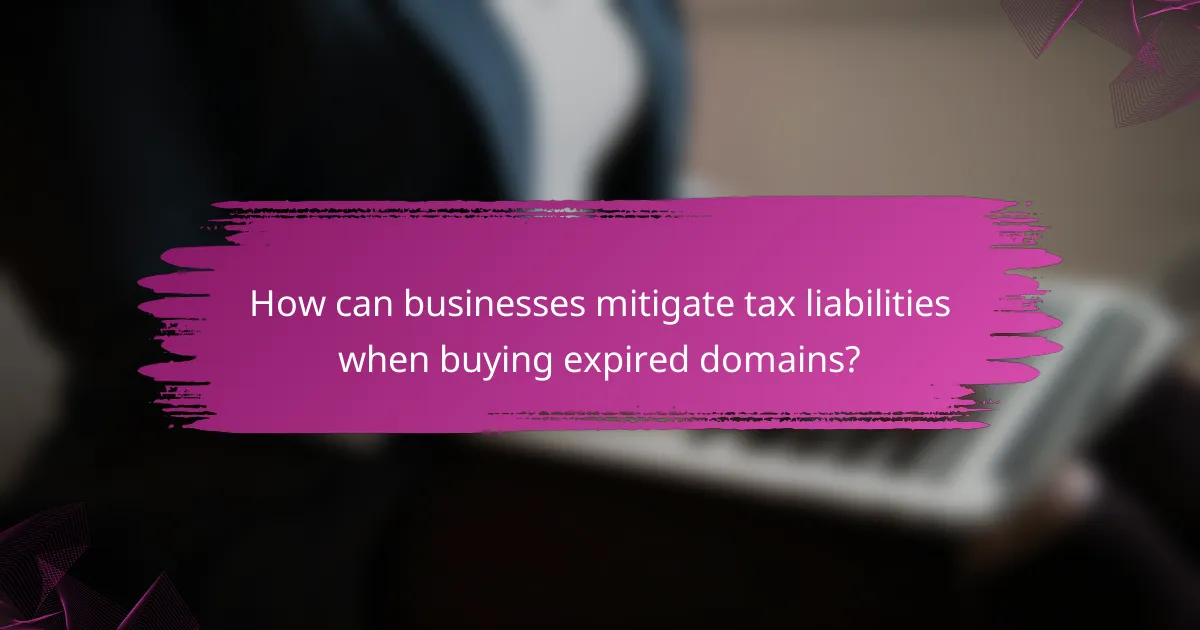
How can businesses mitigate tax liabilities when buying expired domains?
Businesses can mitigate tax liabilities from purchasing expired domains by employing strategies like tax-loss harvesting and utilizing available tax credits. These approaches can help offset gains and reduce overall taxable income, making domain investments more financially viable.
Tax-loss harvesting strategies
Tax-loss harvesting involves selling investments that have lost value to offset gains from other investments, thereby reducing taxable income. When buying expired domains, if a domain does not appreciate as expected, selling it at a loss can help balance out profits from other domains or business activities.
To effectively implement this strategy, keep detailed records of all domain purchases and sales. If a domain is sold for less than its purchase price, the loss can be used to offset capital gains, which can be particularly beneficial during tax season.
Utilizing tax credits
Utilizing tax credits can further reduce tax liabilities associated with purchasing expired domains. Certain credits may be available for businesses investing in digital assets, depending on local regulations and the nature of the business operations.
Research available federal and state tax credits that apply to your business model. For example, if your domain purchase is part of a broader technology investment, you might qualify for credits aimed at encouraging tech development. Always consult a tax professional to identify applicable credits and ensure compliance with tax laws.
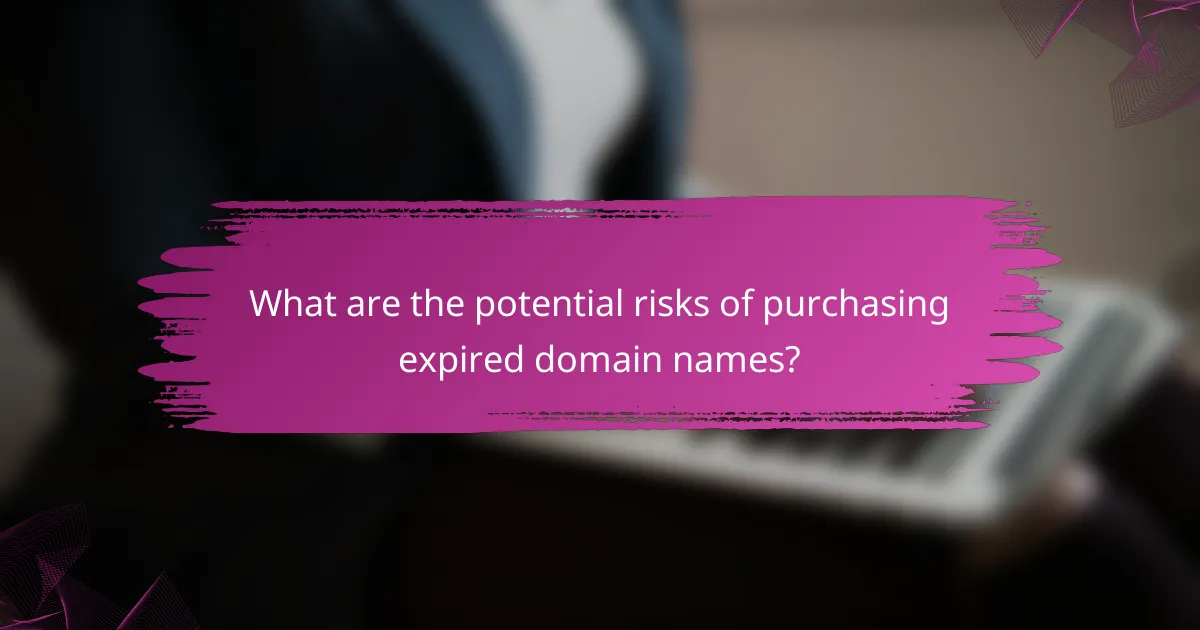
What are the potential risks of purchasing expired domain names?
Purchasing expired domain names carries several risks, including legal complications and search engine optimization (SEO) challenges. Buyers should be aware of trademark issues and the potential negative impact from the domain’s previous ownership.
Legal risks associated with trademark issues
When acquiring an expired domain, there is a risk of infringing on existing trademarks. If the domain name closely resembles a registered trademark, the original owner may pursue legal action, potentially resulting in the loss of the domain and financial penalties.
To mitigate this risk, conduct thorough trademark searches using resources like the United States Patent and Trademark Office (USPTO) database. If a trademark is found, consider avoiding the purchase or consulting a legal expert for advice.
SEO risks from previous ownership
Expired domains may have a history that negatively affects their SEO performance. If the previous owner engaged in black-hat SEO tactics, the domain could be penalized by search engines, leading to lower visibility and traffic.
Before purchasing, analyze the domain’s backlink profile and history using tools like Ahrefs or SEMrush. Look for any red flags, such as spammy links or a history of penalties, to ensure the domain has a clean slate.

What emerging trends affect the taxation of digital assets?
Emerging trends in the taxation of digital assets, including expired domain names, are influenced by regulatory updates and the growing use of cryptocurrency. These factors can significantly impact how transactions are reported and taxed in the USA.
Regulatory changes in digital asset taxation
Regulatory changes are reshaping the landscape of digital asset taxation, making it essential for buyers of expired domain names to stay informed. The IRS has begun to clarify its stance on digital assets, categorizing them as property, which means capital gains taxes may apply upon sale.
As regulations evolve, it is crucial to track any updates that could affect tax obligations. For instance, the introduction of new reporting requirements or changes in how gains are calculated can impact your overall tax liability. Consulting a tax professional familiar with digital assets can help navigate these complexities.
Impact of cryptocurrency on domain purchases
The rise of cryptocurrency has introduced new dynamics to the purchase of expired domain names, particularly regarding taxation. When domains are bought with cryptocurrency, the transaction may trigger capital gains taxes based on the appreciation of the cryptocurrency used.
For example, if you purchase a domain for $1,000 worth of Bitcoin that was originally bought for $500, you may owe taxes on the $500 gain. Understanding the implications of using cryptocurrency for such transactions is vital to ensure compliance and avoid unexpected tax burdens.
